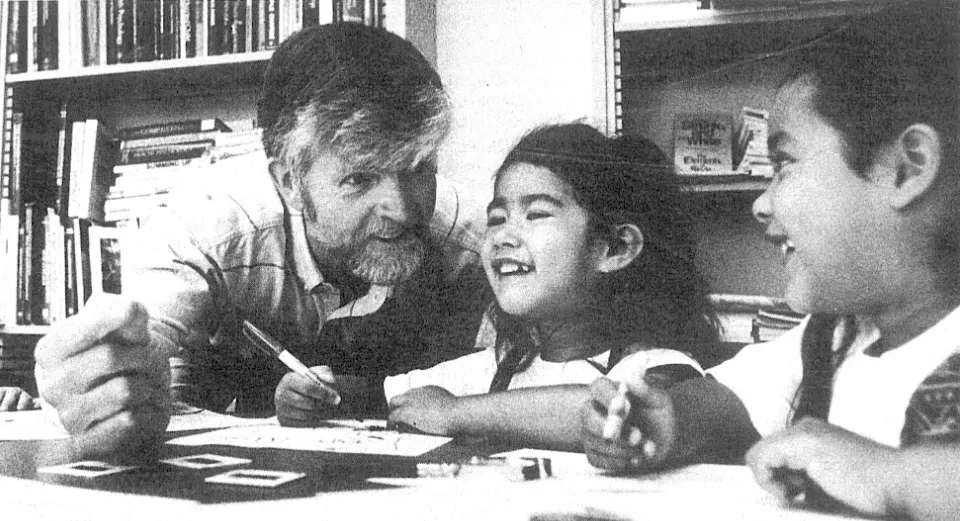
Carl Thoresen, Stanford education professor and alumnus, remembered as a lifelong learner and devoted teacher
There was a time early in Carl Thoresen’s academic career when he thought he might be a historian. He majored in history as an undergraduate at UC Berkeley, but despite stellar grades and an invitation from his adviser to pursue a doctorate in the field, the extroverted Thoresen decided historical research was too isolating for him. Instead, he wound up becoming an influential and esteemed psychologist, credited with a groundbreaking study on how behavioral changes can improve the health of some cardiac patients.
A member of the Stanford Graduate School of Education faculty for 31 years, Thoresen died on October 20. He was 87.
Thoresen was born in San Francisco but lived in several parts of the United States as his father, an Army cook, moved from one assignment to another. The death of his father from a heart attack when Thoresen was 19 inspired a lifelong interest in fitness and health.
He was a member of the crew team at Cal, and by his own admission “a jock” without much direction during his undergraduate years. After deciding against history as a graduate school option, he earned his teaching credential and spent five years as a physical education instructor at San Jose middle schools.
A chance encounter with a pioneering scholar in educational counseling motivated Thoresen to switch careers. Encouraged by a colleague to check out Stanford, Thoresen showed up on campus unannounced and with no guide. As he told an interviewer in 2017, Thoresen was wandering the halls of the Education Building on a Saturday morning when he stumbled upon Prof. H.B. McDaniel working in his office. The ensuing conversation persuaded Thoresen to apply to GSE (then Stanford University School of Education), where he earned a master's and then a PhD in 1964.
After two years on the faculty at Michigan State, Thoresen returned to Stanford as an associate professor and remained at the university until his retirement in 2000.
A Guggenheim fellow and the co-author of nine books, Thoresen is best known for a five-year study that demonstrated how the recurrence rate of heart attack patients with type A personalities could be substantially reduced by a program of behavioral changes, compared with more traditional treatments such as medication, diet and exercise. Participants in the experimental group that received type A counseling had a recurrence rate of 12.9 percent, while those in the control group had a rate of more than 21 percent.
The study was an example of the empirical research Thoresen preferred. He was a devotee of B.F. Skinner. ”I really respected Skinner’s ideas,” he once said. “Why don’t we really get down and talk about what you do and say? We don’t need all these theories—they can be logical, but where’s the empirical evidence?”

Carl Thoresen with local school children in 1991. (Image by Renee Burgard)
Thoresen’s interests were broad and diverse. In the early 1970s, along with Stanford law professor Michael Wald, Thoresen founded the Learning House, a home in a downtown Palo Alto neighborhood for so-called “incorrigible” youth. In 1999, Thoresen led a study in collaboration with the Stanford Forgiveness Project to gauge the effects of forgiveness training on a range of psychological and physiological variables. After his retirement, Thoresen served as a senior fellow at the Spirituality and Health Institute at Santa Clara University.
In a 2009 profile in Counseling Psychologist, author Alex Harris said the Thoresen inspired others in his field. “His scholarly work, professional service, teaching, and mentorship have motivated many counseling psychologists to radically expand their areas of inquiry. He was among the first to focus counseling on observable behaviors and to apply psychological science and interventions to physical problems in medical settings.”
On an online memorial page dedicated to Thoresen, one of his former students and advisees, James Hannum, said the professor “invigorated me with the breadth and energy of his intellect.”
“Carl was the model of a lifelong learner who boldly reinvented his professional focus several times over a long, productive career. I fondly remember the sparkle in his eye and deep, appreciative laugh as he talked about a topic of interest.”
Thoresen is survived by his wife of 62 years, Kay; his son, Trygve; two daughters, Kristen Bridgeman and Amy Goforth; and seven grandchildren.



